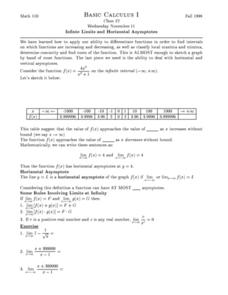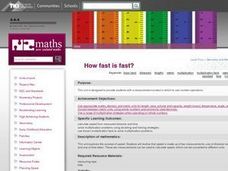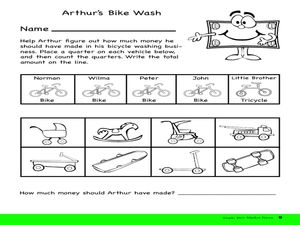Curated OER
Lions and Tigers and Bears - Oh My!
Research animals and develop a non-fiction presentation. Students will complete research on a particular animal and determine the animal's characteristics as well as habitat before choosing a differentiated project to present using the...
Curated OER
Monitoring an Epidemic: Analyzing Through Graphical Displays Factors Relating to the Spread of HIV/AIDS
Tenth graders differentiate pandemic and epidemic. In this health science lesson plan, 10th graders analyze how HIV and AIDS affect different countries. They construct and interpret different types of graphs.
Curated OER
Mathematics Alive: Environment and Design of Human Habitats
Third graders explore the structural composition of buildings and houses. In this math lesson, 3rd graders explain how architecture is related to mathematics. They create a blueprint of a structure with at least three different spaces.
Curated OER
Species Diversity in Ecosystems with Different Techniques of Land Management
Students visit numerous places to help in their understanding of Ecology. In this biology lesson plan, students will learn about characteristics and how to identify numerous plants and animals. This lesson plan allows for many field trip...
University of Colorado
Modeling Sizes of Planets
The density of the huge planet of Saturn is 0.7 g/cm3, which means it could float in water! In the second part of 22, science pupils explore the size and order of the planets. They then calculate weight and/or gravity and density of...
NOAA
Waves
Is it possible to outrun a tsunami? After watching a presentation that explains how waves and tsunamis occur, class members investigate the speed of tsunamis triggered by an earthquake.
Howard Hughes Medical Institute
Seed Dispersal in Tropical Forests
How do seeds get around? It's not like plants can control seed dispersal—or can they? Dig deeper into the amazing mechanisms of seed dispersal observed in tropical plants through interactives, a video, and plenty of hands-on data...
Curated OER
Stability of Equilibrium Values
In this stability of equilibrium values instructional activity, students explore equilibrium solutions and classify them as asymptotically stable or not asymptotically stable. They justify their reasoning. This four-page instructional...
Curated OER
Order of Operation
Young scholars solve problems using the order of operation. In this algebra lesson, students factor, subtract, add and divide using the correct order to remove parentheses. They simplify expressions by combining like terms.
Curated OER
Integers
Students perform order of operation using integers. In this algebra instructional activity, students apply properties of integers as they add, subtract, multiply and divide integers. They work in groups to complete a RAFT assignment.
Curated OER
Around the World With Geometry
Students identify shapes, create shapes, and make a pyramid, a drum, and a sail using their shapes. In this shapes lesson plan, students also identify plane and space shapes.
Curated OER
Equations, Formulas and Identities
Pupils rewrite word problems using the correct symbols. In this algebra lesson, students find the trigonometric identities and use them to solve problems. They write equations for the trigonometric ratios.
Curated OER
Infinite Limits and Horizontal Asymptotes
In this infinite limit worksheet, students compute horizontal and vertical asymptotes. They use trigonometric functions to find the limits of functions and compare results. This two-page worksheet contains examples and explanations and...
Curated OER
The Meaning of Algebraic Expressions
Students define equations and expressions. In this algebra lesson, students review important vocabulary words to do with equations and solving problems. They simplify equations and expressions using addition, subtraction, multiplication...
Curated OER
Weather Dot Com
Students examine the need for a standard unit of temperature and measure temperature with a thermometer. They discuss the details of a thermometer and the calibrations used, record temperature data for inside and outside, explore...
Curated OER
Maxima and Minima Problems
Students calculate the maxima and minima of quadratic equations. In this calculus activity, students apply the derivatives by finding the maxima and minima using real life application. They solve optimization using the derivative.
Curated OER
The Cube and Coin Challenges
Second graders participate in several games based on colored cubes and coins. They try to figure out the relative rate at which things happen and assess the concept of playing a fair game with their peers. Each student compare familiar...
Curated OER
Making Benchmards--Length
Students explore the idea of having Benchmarks to estimate the length of given objects. Students demonstrate acquired knowledge of the basic units of length by making reasonable estimates. Students create a personal benchmark.
Curated OER
How Fast Is Fast?
Students make sensible estimates and check the reasonableness of the answers. Students write and solve problems involving decimal multiplication and division. Students perform calculations with time.
Curated OER
Surfing the Waves
Learners use online resources, including animations,to define the slope of a curve and how to calculate the slope. They solve 8 problems online, using the definition of the derivative of a function at a point to calculate slope of the...
Curated OER
Market Prices
Second graders understand that prices change. In this business, price and labor lesson, 2nd graders define the words market and price. Students read Arthur's Funny Money and answer questions related to earning and spending money....
Texas Instruments
A Tale of Two Lines
Students graph systems of equation. In this calculus instructional activity, students graph their lines on a TI calculator. They identify the point of intersection and the type of solution.
Curated OER
Probability and Expected Value
Students collect data and analyze it. In this statistics lesson, students make predictions using different outcomes of trials.
Curated OER
Egyptian Hireroglyphs
Fifth graders identify the aspects of Ancient Egyptians and Heiroglyphs. They compare and contrast Egyptian Hieroglyphs with the decimal number system. Students recognize the decimal number system and compares to bases other than ten.

























